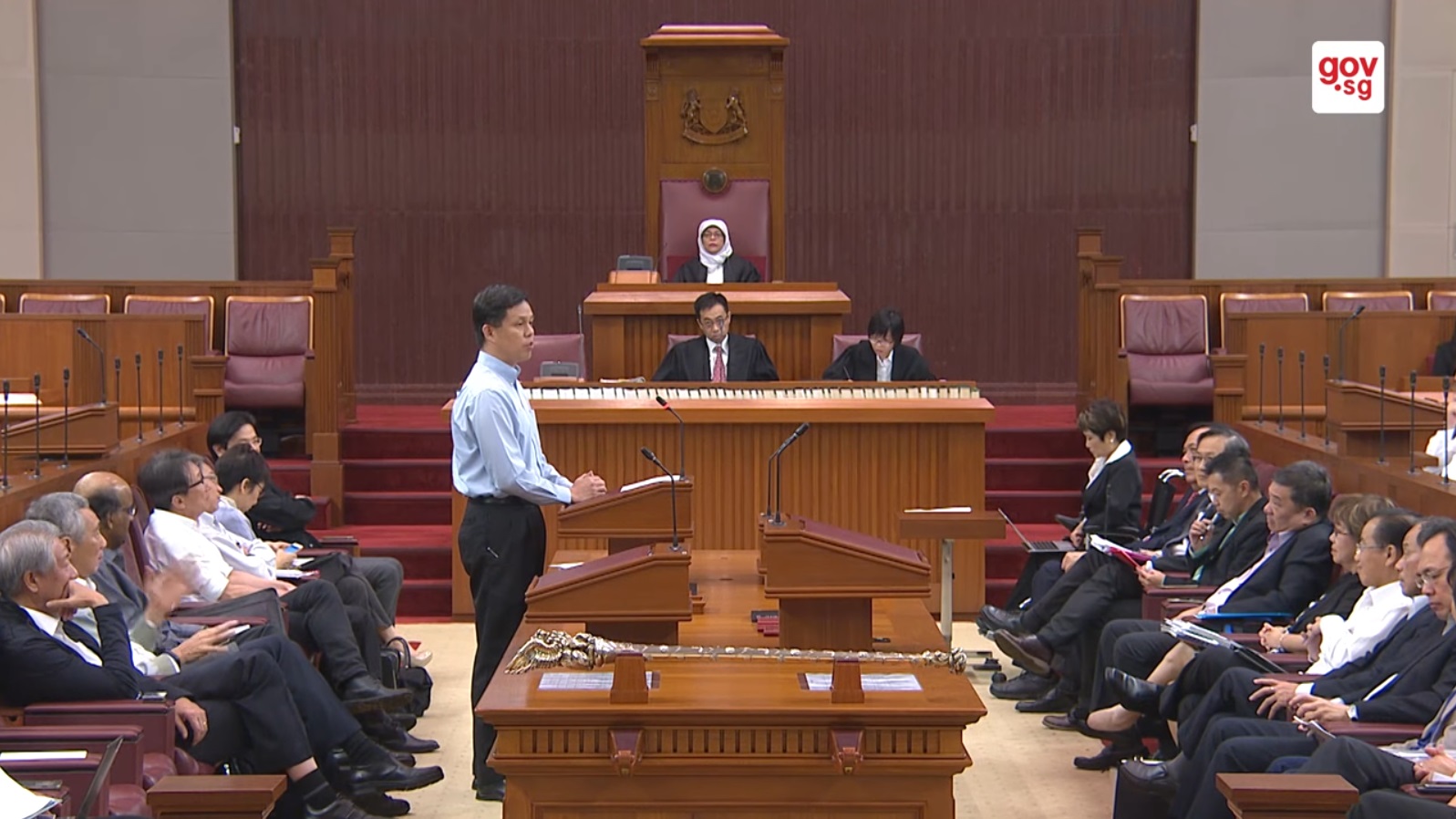Budget 2017 was supposed to be one of those government mid-term boring types to build upon — "for each budget builds on past budgets" — and prepare Singapore for economic challenges that lie ahead.
Who would have expected that it would be dominated by the issue of water price hikes?
Anyway, here is a quick recap of what has happened so far over the past week of Budget debates regarding the water price hikes:
1. Workers' Party (WP) parliamentarians made an impact in the first two days of the Budget Debate.
Non-constituency Member of Parliament (NCMP) Daniel Goh called it a "wait-and-see" budget, describing it as one that the government is encouraging Singaporeans to "get busy with training and development, mapping and testing, partnering and team building" to "prepare for the fight to come".
Goh called for the strengthening of safety nets for middle-income households as the water price hikes "will have knock-on effects on the costs of living, as all areas of everyday life are affected by the use of water and electricity".
NCMP Leon Perera provided one of the soundbites of the Budget so far by saying that "the timing of these price hikes seem more synchronised to the political cycle than to the economic cycle", as he noted the numerous price hikes (parking fees, diesel usage costs, gas, electricity, conservancy charges) within the space of a few months.
He said that while "multiple price hikes within the space of a few months may make good political sense", he asked if "they make good economic sense" in the current economic climate.
How big was the impact of their speeches in parliament?
First, Goh's "wait-and-see" budget speech was selected by The Straits Times as the speech of the day on the first day of the Budget debate.
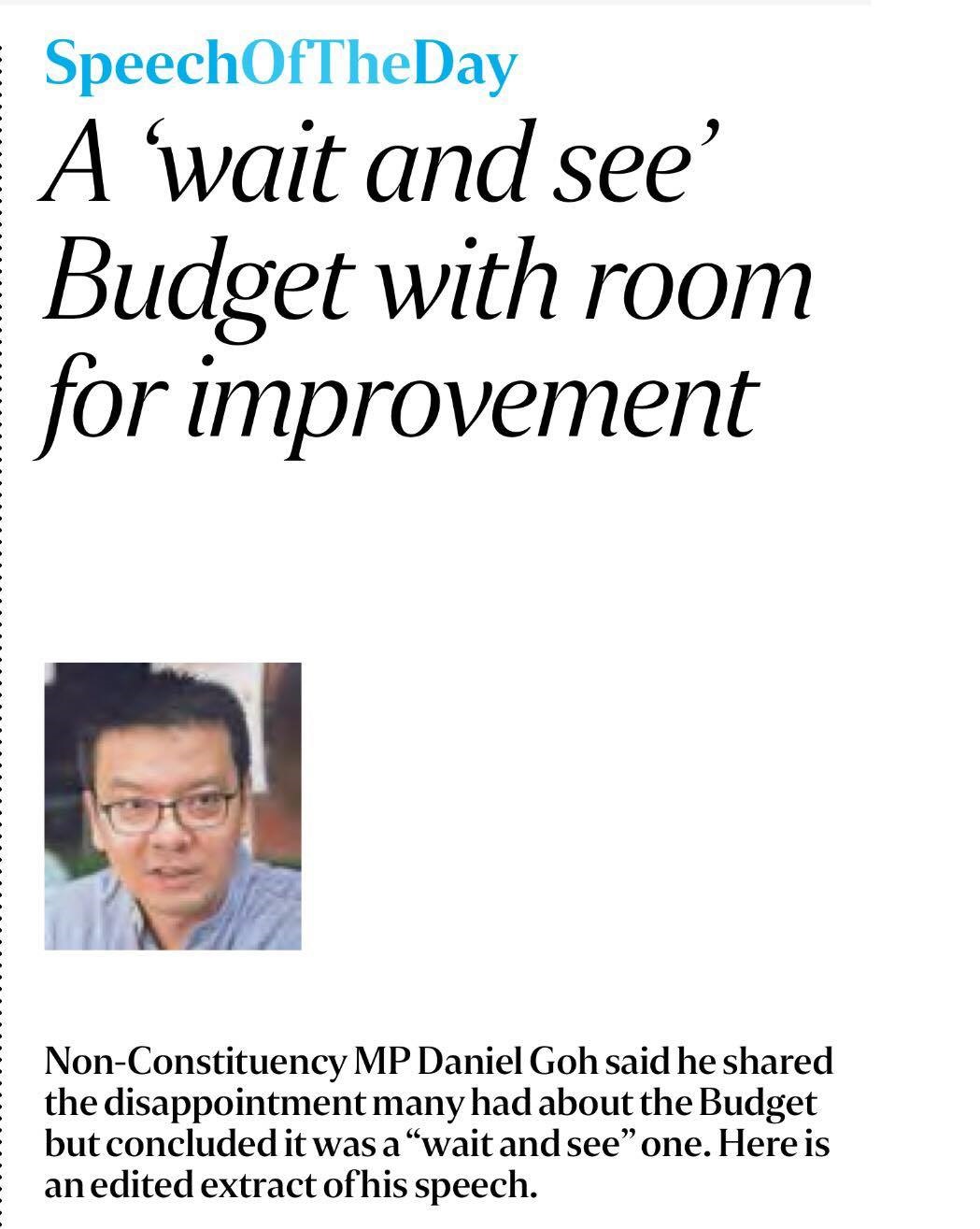 Source: Straits Times.
Source: Straits Times.
Second, Labour Chief Chan Chun Sing, who was one of three ministers who spoke on the water hike, quoted key soundbites from the WP NCMPs:
" frameborder="0" allowfullscreen>
"This is not a ‘wait-and-see’ Budget. If this is a ‘wait-and-see’ Budget, we wouldn’t have to put in place the mechanisms for carbon pricing, we wouldn't have to talk about diesel taxes or water taxes. If this is a political Budget, we don’t have to talk about any of this above.”
To be fair, WP MPs and NCMPs were not the only ones seeking clarifications about the water price hikes.
Quite a few PAP MPs have voiced concerns about the hikes too.
MP for Mountbatten Lim Biow Chuan, for instance, asked the Government to defer the water price increase for this year due to the uncertain economic situation and to ensure that businessmen do not profiteer from it.
Joan Pereira, MP for Tanjong Pagar GRC, said that residents and businesses alike were taken by surprise — “why so much, so suddenly”. Pereira said that while they accept that a 30 per cent increase after 17 years is not unreasonable, "what they didn’t like is that there were no prior public consultations about the increase".
But what did the relevant Chairman of the Government Parliamentary Committee (GPC) say?
Now, just in case you're not aware, GPC members are PAP backbenchers, and each GPC is backed by a resource panel that members of the public are invited to join. It was envisaged that GPC members would act as a sort of proxy opposition in Parliament, challenging and keeping in check the views of Cabinet members.
And the chairman of the GPC for Environment and Water Resources is none other than Lee Bee Wah, MP for Nee Soon GRC:
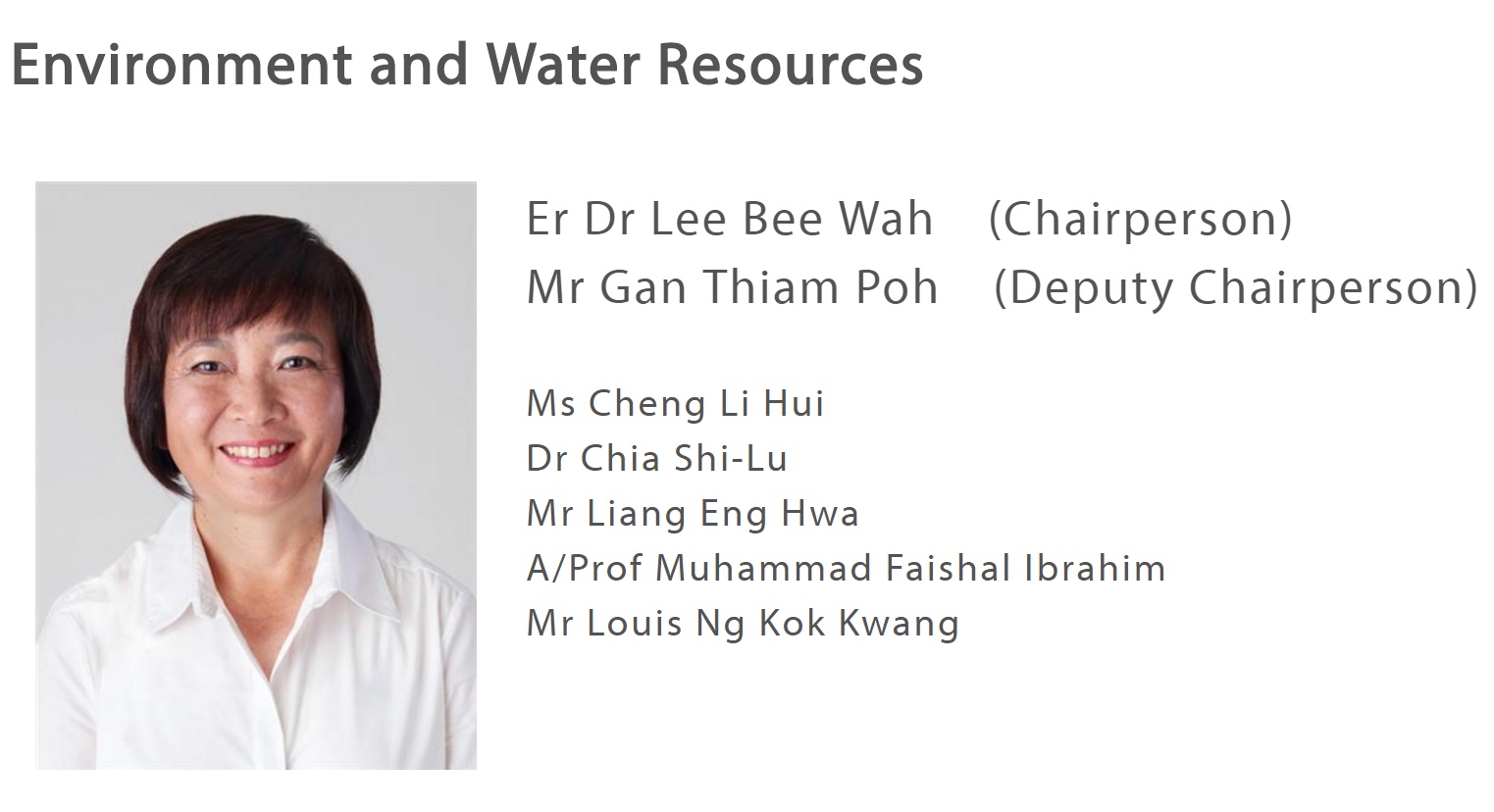 Source: PAP website.
Source: PAP website.
Last week, she said, “I think the increase in water prices is just to bring up awareness of the importance of water.”
Guess this is why we have opposition voices in parliament.
2. Three fourth-generation ministers came forward to explain the water price hikes.
We heard first from Masagos Zulkifli, Minister for the Environment and Water Resources.
When it was his turn to speak in the debate on the first day, Masagos said it was "to reflect water’s true scarcity value".
" frameborder="0" allowfullscreen>
To address Aljunied GRC MP Pritam Singh's query about the pricing of water, Masagos explained some mechanics about how government prices water according to its Long Run Marginal Cost (LRMC) but did not elaborate on how the LRMC is computed due to “commercial sensitivities”.
To conclude, Masagos said there is urgency to have our water policies and pricing in place so that we can moderate demand by both businesses and households, while also building the infrastructure we need to have a secure water supply.
Chan Chun Sing, Minister in Prime Minister's Office, turned up the heat and drama in the debate when he took the stand.
Chan took six seconds to emphasise:
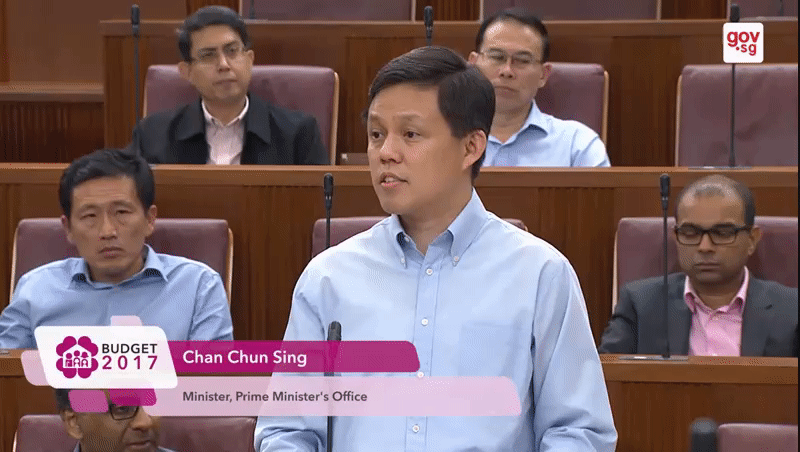 Source: Gov.sg Youtube channel.
Source: Gov.sg Youtube channel.
"Water (pause) is existential..."
He then posed two questions to members of the house: "Do we agree that water is existential to our country's survival? Do we agree that we should price water properly? If we agree on these two questions, we can go to the mechanics of how to price it properly, what we should consider."
Chan acknowledged that the intense debate meant that more needs to be done “to socialise our people to the challenges that we are facing on water front”, as the debate "reflects that we have left this issue off our nation's psyche for too long.”
Chan concluded by talking about what it meant to be a responsible government. He said that a responsible government is
“One that not only takes care of short-term needs of the people, but also the future. One that prices essentials properly and does not distort the market, leading to more subsidies that will burden future generations.”
“A responsible Government is not one that will raise prices and not take especially greater care for the poor. It is not one that pretends it will make difficult decisions but no one will have to bear a greater part of the responsibility to help those with less.”
“A responsible Government is someone who knows what is not sustainable, and will put a stop to it now.”
In his Budget round-up speech, Finance Minister Heng Swee Keat emphasised that "water sufficiency is a matter of national survival".
He added that "securing a sustainable water supply for Singapore has been an all-consuming pursuit of the government since independence".
" frameborder="0" allowfullscreen>
Heng concluded by saying that the government "pays for part of the total cost of securing a safe and clean supply of water for our people and businesses".
This is because while the government will spend about $3 billion in the next five years on other sewerage network and water projects, and to strengthen the resilience of our water supply in the next five years, they will only collect $1.6 billion from water conservation tax.
3. Letting the second generation of PAP and WP leaders debate, PM Lee contextualised the issue for the younger generation.
It was time for Prime Minister Lee Hsien Loong to weigh in too, with a Facebook post:
Missing our point?
At the end of the day, no Singaporean would deny that water is of strategic importance in Singapore.
No Singaporean would deny that "water is existential" to Singapore's survival and that water should be priced properly.
Older folks remember our water rationing period.
NSFs and NSmen know that deterrence during war means defending Singapore's water supply.
Many of us would also have learnt about the important of our "4 National Taps" in textbooks and the NEWater Visitor centre.
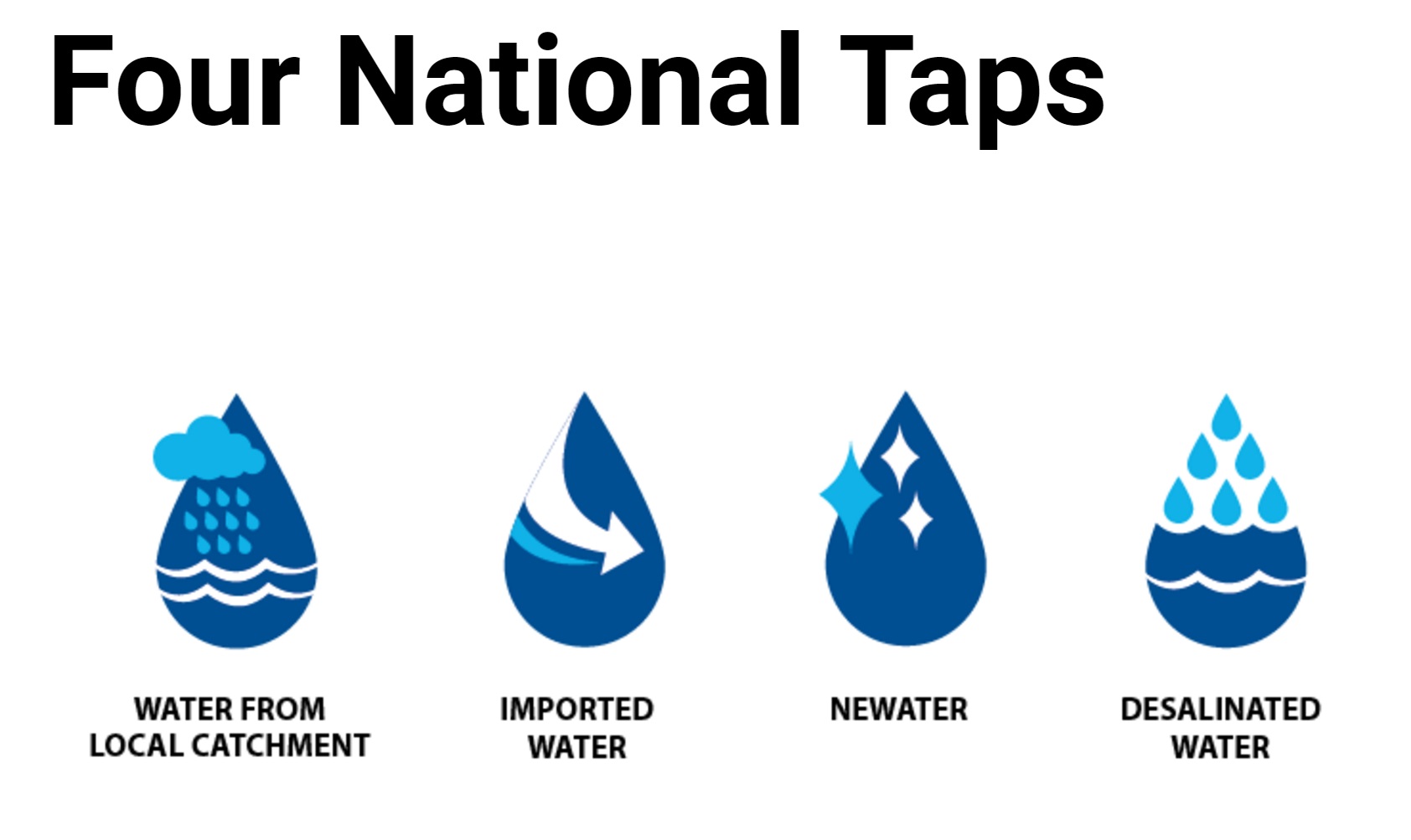 Source: PUB website.
Source: PUB website.
More importantly, we know and understand why we have to drink "sai zui" (Hokkien for "sh*t water") — a long-running joke by the Malaysians about us.
So the question for most of us is not why we have to raise water prices, but why now, and without much consultation?
As Fiona Chan said in her commentary ("Water price hike necessary, but why now?") in The Straits Times that "water has always been scarce and crucial for Singapore — the government should shed light on what tipped the scale this year".
Minister Chan acknowledged that there is never an easy way to manage the issue of price hikes and highlighted that a 30 per cent increase after 17 years translates to an increase of about 1.6 per cent a year.
Even with this increase, Heng also shared that the government is still running a loss of $1.4 billion on sewerage networks and water projects over the next five years.
But agreeing that water is scarce and needs to be priced properly doesn't mean that Singaporeans cannot disagree on the timing or try to understand the context of the hike.
This is because we still do not fully understand the judgement call to raise water prices this year, as the reasons given by all three Ministers are not entirely new.
Many of these reasons can be made before 2015.
As recent as August 2015, then-MEWR Minister Vivian Balakrishnan told MP Seah Kian Peng that there "is no need for an adjustment (on water price) at this point".
He explained that the price of potable water in Singapore is pegged to the Long Run Marginal Cost (LRMC) of producing desalinated water and NEWater.
He added that although "labour and equipment costs have risen during these 15 years, PUB has been able to keep the LRMC relatively stable because of improvements in membrane technology and productivity".
He concluded that "the key variable for the future is the price of energy".
Back to timing, there is something new and specific to this year for not raising water prices, though: the uncertain economic circumstances facing Singapore. Will such a big price hike adversely impact on Singaporeans and businesses?
Our MPs and NCMPs had the empathy to highlight these issues raised by the residents they represent — some of whom suggested alternative ways we could encourage Singaporeans to save water.
Perhaps some amount of consultation and discussions would have provided the opportunity for Singaporeans to share these ideas, to create the mindset change needed to conserve water.
Now that post-SG50 Singaporeans have gotten used to a more consultative, responsive and inclusive government, many of us are just a little surprised that the government's show of empathy is being explained mainly in dollars and cents this time.
Let's hope the government, one that is much more consultative than the earlier ones, do not merely dismiss Singaporeans as a bunch of "champion grumblers".
Since you're here how about another article:
10 things you never knew you could buy on Amazon
Watch out, paper qualifications. Real life experience is coming for you.
Top photo from Gov.sg YouTube channel.
If you like what you read, follow us on Facebook and Twitter to get the latest updates.
If you like what you read, follow us on Facebook, Instagram, Twitter and Telegram to get the latest updates.
